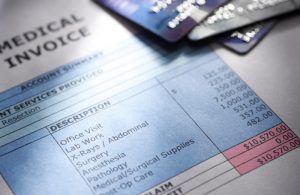These days, everything is online and seemingly available to everyone. That includes medical records and files. This is very convenient for you and your doctor since you can travel from doctor to doctor and even state to state, with your medical records following along. Unfortunately, it’s also convenient for identity thieves and hackers who want to take information in those records and scam you or take your financial information.
There are ways you can protect your medical information online without being an IT guru or hiring a security team for your computer. Here are a few commonsense things anyone can do to protect their sensitive information.
 Don’t Give Out Your Personal Information Online. The only places you should be filling out online forms are at your insurance company site, Medicare or your state insurance site, and your doctor’s site. They already have your insurance number and Social Security number. There is no other location that needs this information. If you receive any emails or phone calls from other sources asking for your information, you can ignore them.
Don’t Give Out Your Personal Information Online. The only places you should be filling out online forms are at your insurance company site, Medicare or your state insurance site, and your doctor’s site. They already have your insurance number and Social Security number. There is no other location that needs this information. If you receive any emails or phone calls from other sources asking for your information, you can ignore them.- Review Your Medical and Insurance Bills. As tedious as this may be, you should be sure that you are only being billed for services you received. Identity theft could lead to double billing or services being billed to your insurance for another person. Even if you don’t pay your own bills (for instance, if you’re on Medicare), you should review your bills periodically.
- Be Careful Installing Anything on Your Phone. “Wellness apps” are a recent fad for cellphones. These handy apps track everything from your daily calorie intake to your CrossFit steps. However, nothing on them is protected by HIPAA. Before installing anything medically related, check the app’s privacy and reporting policies. These will be buried in the end-user licensing agreement (EULA), so if you don’t want to wade through that, don’t install the app.
- Clear Your Cache Periodically. This is a computer nerd’s way of saying remove all the tracking software from your computer. Websites use tracking software, called “cookies,” to keep tabs on who visits their sites and what they look at. Legitimate sites use these cookies to send you offers and information you might want. Scammers use them to send you malicious software (“malware”) and scams so they can steal your money and information. If you don’t know how to dump your cache, ask a tech-savvy relative, or call an IT specialist.
- Keep Your Medical Data Off Social Media. The number of people who post their entire hospital stays on Facebook is shocking. If scammers know where you were, they know where your records are.
Reporting Fraud and Identity Theft
 If you are a victim of fraud, scams, or identity theft, let the proper authorities know. As embarrassing as it may be for you, Medicare and insurance companies need to know when their systems have been attacked so they can try to prevent it in the future.
If you are a victim of fraud, scams, or identity theft, let the proper authorities know. As embarrassing as it may be for you, Medicare and insurance companies need to know when their systems have been attacked so they can try to prevent it in the future.
Medicare has a dedicated site for fraud and abuse reporting. Even if you’re not sure where or how the problem happened, you should let them know. If your records were stolen through a breach in a doctor’s office or pharmacy that bills Medicare, for instance, thousands or even millions of other consumers may be at risk.
Insurance companies and healthcare providers also have fraud and identity theft investigation teams in their departments. If you believe someone besides yourself is using your insurance, or their treatment was included in a bill without your knowledge, contact the insurance company or the provider right away. Whether it is a breach or just an error, they like to be made aware of the problem.
If You Need Legal Assistance
If you’re not sure about the possible consequences of a fraud or theft case, or if you believe you were targeted by someone and want additional advice, you should speak to a legal professional. Fraud is a serious crime with both civil and legal penalties, and you should know what your rights are regarding recovering compensation for the exposure of your records or insurance.
Medical records theft can eventually harm your credit if the thief or thieves run up bills against your name, so timely action is essential. If you believe you were the victim of a medical records breach, or if you want more information, call the St. Louis personal injury attorneys of OnderLaw. We will be glad to review your case and let you know the status and your options.
It’s always better to be overly cautious when protecting your medical records, so never think you’re wasting your time or ours. Call for a consultation today.






